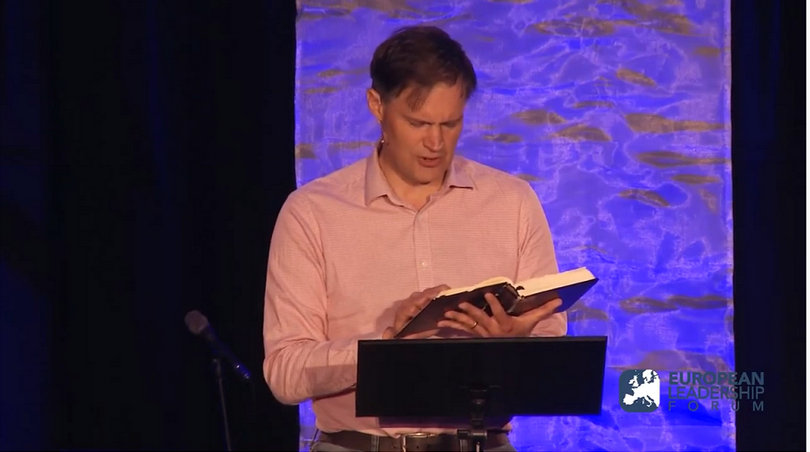Peter J. Williams reminded believers to steward their God-owned resources to prepare for eternity from Jesus’ puzzling parable of the Unjust Manager.
In one of his talks at the European Leadership Forum Plenary Session on May 24, Peter Williams, Principal and CEO of Tyndale House, an international research centre and library for biblical studies in Cambridge, delivered a talk titled ‘Our Friends’ on Luke 16:1-18, as part of a series of sermons on Luke Gospel.
The parable of the Unjust Manager is followed by Jesus’ teachings which are often deemed unrelated. Williams started his talk by explaining the setting and connection of the parable. The story was told to the disciples (16:1), in the hearing of the Pharisees (16:14-15). It was followed by verses about money (16:10-13), involving the themes of being faithful/dishonest, handling what belongs to another, and not serving two masters.
Upon the Pharisee’s mocking in verse 14, Jesus addressed 4 verses to them (v15-18). Williams summarized four points from these verses: Pharisees were virtue signaling (v15); what humans value highly is an abomination (which means extremely unclean) in God’s eyes; no pen stroke from the law will pass yet Jesus has fulfilled it for us (v16-17); people shouldn’t take a casual attitude to divorce, which Williams believes is deeply connected with money (v18).
Williams, Affiliated Lecturer in the Faculty of Divinity at the University of Cambridge, also stressed that the parable was connected with the surrounding stories (15:11-32 and 16:19-31) by tracing common words and concepts. He concluded that “we should understand these stories in the light of each other”, and that the setting highlights three themes: family, money, and hypocrisy.
Williams extracted a few interesting facts from the story. He called attention to the fact that the manager was stewarding the rich man’s property, rather than his own. After being sacked, the manager is given a short notice period, during which he buys himself friends using his master’s resources, by removing half of the debts from the indebted. Surprisingly, the master seems to be impressed. According to Williams, that verse did not indicate a commendation for wasting the master’s money, but simply for his shrewdness.
There are things that shouldn’t be taken from this story, said Williams. It does not teach people to be unjust, or selfish, or that people can be accepted into heaven based on the way they spend money.
However, Williams said this story does evoke our situation in many ways. We believers steward resources on behalf of the owner, our God, and we sometimes mismanage as well. “Everything in this life is loaned to us”, said Williams, “we don’t own anything at all.” But he reminded listeners that verse 12 suggests that believers might be given their own, real inheritance in heaven, as co-heirs with Jesus. Compared with the real inheritance in heaven, our earthly belongings which do not even really belong to us seem small and worthless.
In the same way that the unjust manager was going to be soon, Williams said we believers too have only a short time to live on earth, which is a short window of opportunity that we have, for preparing for heaven and making heavenly investments. Instead of investing in perishable gardens and houses, invest in heaven. Instead of virtue signaling, act with real love. Again, Williams reminded listeners not to understand it as earning access to heaven, because this parable was told to the disciples, who had believed. The foundation of the parable is that Jesus has paid for our sins. Yet, Williams said that Jesus was telling the disciples to be as shrewd as the worldly businessmen, understanding the urgency of the short “notice period” and making the most profitable investment: investing in heaven by offering our lives to God.
Williams closed the talk by urging the listeners, “let us invest all of the things God entrusted to us for future purposes, for His glory.”












